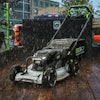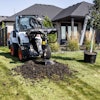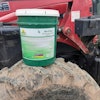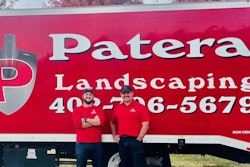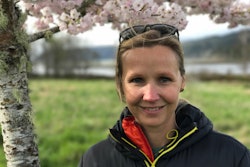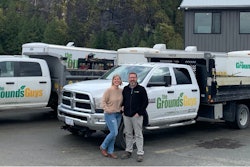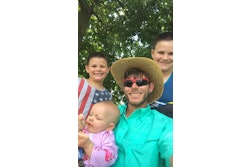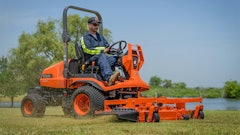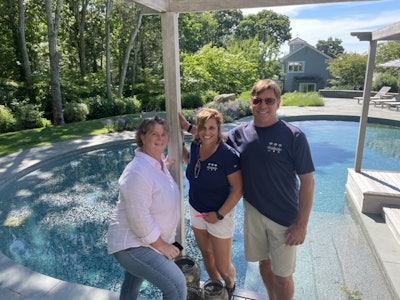
Linda Silich and Kimberly Hren
Partners and founders, Groundworks Landscaping, East Hampton, N.Y.
Green Industry Pros: How did you get into the green industry?
Hren: It was always in my blood. I grew up on the property, was at the nursery every day either working, playing or bothering my aunts and uncles who also worked here. I loved to see the sketches my father did at home in the evenings. I started to sketch and design and then followed my passion for that to college for environmental design.
Silich: I met Kim and worked for her family, and then we started our own company. I met Ed Hollander, a landscape architect who also had a past history working with Kim, so it was important that he liked her new partners.
GIP: Tell me a little more about your company.
Hren: We started, just the three of us, in the basement of Linda and Andy’s home. We built our business from there, with a lot of referrals, Ed Hollander projects and our own networking. We have grown comfortably and have exceeded our expectations as far as what we have become. I think we always wanted a successful company. Who doesn’t when they are in business? However, this has become more than that to us. It’s a business, yes, but it's family, and we all work very well together. We have come back to where my life started; we are now in the same location that my family had the garden center started in 1939. We currently run it as a design gallery and showroom and focus mainly on design, installation and property care management.
Silich: It's very cool because we just celebrated our 20th anniversary. We went from just three of us to 50-plus employees, three divisions (design and install, property care and a planter division) and we grew from a $500,000 firm to a nearly $8 million company. Overall, we wanted to be a community-driven company. Once the word got out that we did the smaller installations and helped people a lot, it grew.
GIP: What have been some of the challenges and successes you’ve encountered along the way?
Silich:
One big challenge is being a woman in a male-dominated industry, especially when two women show up to the jobsite. Kim would say she's in a man's world, and it's very difficult until they hear her talk. She is so unbelievably, instinctively knowledgeable about everything. She really gained the respect, and that helped me and paved the way. That said, sometimes, I don’t necessarily feel like I get the same amount of respect either because of their perception or because I’m a woman or I have kids or they think I don’t take it seriously. Overall though, we’ve gotten over that.
Additionally, we've had some issues with not getting workers in time through the H-2B program, and the 2008 market crash influenced us to start our maintenance division. Finally, we moved over to Kim's family's location to take over the garden center. While that was fun and exciting, it wasn't a huge money maker.
GIP: How did you overcome the challenges?
Silich: Perseverance, teamwork, attending numerous trade shows, hiring Mary Grunder and The Grow Group; implementing key activities that have made us better such as our core values; Monday morning meetings with everyone; reviewing safety procedures; and ending with a physical warmup to get people psyched up for the week ahead.
Hren: This meeting has made our team more cohesive, and we are all working toward a common goal.
GIP: What’s your favorite tool/piece of equipment to use?
Silich: Aspire. It really has helped our company and individuals to be accountable for actions and also helps serve as a history of activities in each account. It also helps to accurately estimate and cost for each job to stay on point during installations. Right before COVID, three or four years ago, we were looking around and were doing our numbers, and with Aspire, we realized we were not making as much money on certain jobs as we should be.
The other thing, being in the Hamptons (and it’s probably going to be a nationwide thing soon), is the low noise and environmentally friendly tool set that we had to really enforce.
Hren: Yes, (Aspire) takes us from the minute the client calls in with the CRM to the final invoicing and even site visits and equipment checks.
GIP: What’s your favorite part about being in the industry?
Silich: I love the front end dealing with clients, figuring out the designs, strategizing with Kim about how each property has its own unique needs and then making the designs come to life for our clients.
Hren: I enjoy figuring out how to schedule and organize a project. From initiating the design through installation to the final product where we turn it over to our property care team, it is rewarding to work with our team in every aspect of each job.
GIP: What advice would you give someone just starting out in the industry?
Silich: Take courses, get certified, learn about the entire trade on a general note and then identify various areas to study and learn even more about grading, irrigation, masonry, design, plant material, know botanical names and talk to similar companies to get ideas. Nail down processes with all facets of the business: operations, design, marketing, finances and keep up with the trends.
GIP: Outside of work, what do you like to do for fun?
Silich: I love personal training others using TRX, working out, Sunday night pool volleyball games or playing cards with my family, entertaining guests and acting like a tourist in the Hamptons, spending time with my family, especially my grandchild and one on the way.
Hren: I love being outside, playing tennis and camping. We live in such a beautiful location, and we are busy, so sometimes it's just good to go sit at the beach and take it all in.

